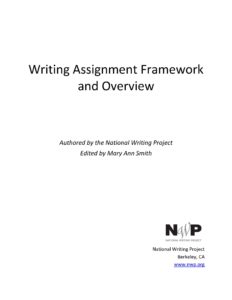Improving Assignments With the Writing Assignment Framework
From the Introduction
The challenge of designing writing assignments can be particularly daunting.
These decisions sit at the center of the Writing Assignment Framework and Overview project. This project has its roots in a study begun for the Consortium for Chicago School Research (CCSR) in 1996. Led by Fred Newmann, then a professor at the University of Wisconsin, and supported by the Annenberg Network Challenge, the CCSR study examined teachers’ assignments and student work emerging from several Chicago public schools. The basis for this empirical study was Newmann’s concept of “authentic intellectual achievement.”
For a writing assignment to be authentic, the task would ask students to (a) construct knowledge in contrast to simply reproducing knowledge; (b) elaborate their writing by making generalizations and supporting them with examples, details, or reasons; and (c) connect their work to issues and concerns that prevail beyond the school’s walls.
Research shows that teachers who give students assignments requiring authentic intellectual work see greater gains on standardized tests (Newmann, Bryk, and Nagaoka 2001).
Tools to Strengthen Writing Assignments
The goal of the Writing Assignment Framework and Overview project is to serve as a classroom and professional development tool—born of research and practice—that will help teachers create and refine challenging assignments for students.
The Writing Assignment Framework and Overview represent the effort of National Writing Project teachers to create tools for themselves and their colleagues that might substantially strengthen their writing assignments.
This resource includes: a framework for asking reflective questions about assignments, a sample one-day professional development schedule, examples of assignments and related student work, considerations for how to review sample assignments and student work, and recommended resources.
Because this tool has been created by teachers for teachers, it is important to say what it is not. It is not a checklist or an evaluation instrument. It is not mandatory, compulsory, or required. It is, however, a tool that respects teachers and their continuous efforts to give their students challenging writing assignments.


